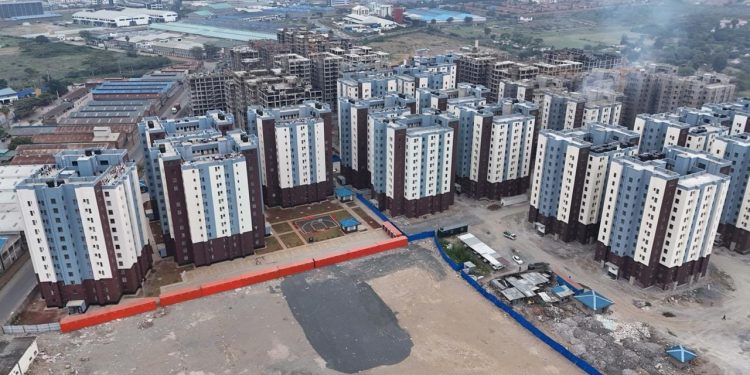The Court of Appeal has given Nairobi Governor Johnson Sakaja six months to finalise and gazette proper zoning and development control rules, warning that the city’s rapid growth cannot continue without a lawful framework.
In a ruling delivered on Friday, September 19, in the Rhapta Road zoning case, the appellate court said Nairobi has been operating in a “policy vacuum” since the old 2004 zoning guidelines expired and the 2021 Development Control Policy remains unapproved.
The court ruled that the city’s vertical growth must be guided by lawful, transparent, participatory, and capacity-conscious regulations, to be delivered within fixed timelines under judicial supervision.
According to the judges, this gap has created confusion, opacity, and the risk of environmental harm in the city’s building approvals.
“Drawing on Article 23(3) of the Constitution and comparative jurisprudence on supervisory remedies, the Court issued a structural interdict — a measured, time-bound set of supervisory orders — to catalyse lawful plan-making without displacing the County’s constitutional role,” read the ruling in part.
“The structural interdict requires Nairobi City County to complete and gazette the necessary zoning and development control instruments within six months, with interim reporting at three months and a final compliance report (including public participation records) seven days after the six-month period.”
The appellate court stated that reports must be served on the parties and relevant civic stakeholders, who may comment, and that it will retain supervisory powers to ensure compliance.
Court Gives Sakaja 6 Months to Formalise Nairobi Zoning Rules on Storey Buildings
The Court said Nairobi can continue processing building applications using current laws and the 2021 policy as guidance, but once the new zoning rules are officially gazetted, all approvals must follow them.
Any projects already approved and acted upon will not be cancelled unless they are clearly illegal.
Also Read: 4 Buildings Seized in Nairobi CBD as Clampdown Kicks Off
The judges noted that the Nairobi City County Development Control Policy 2021 was prepared through technical processes and public consultations and has been consistently used by the County Executive as an administrative guide.
However, without formal County Assembly approval and gazettement, it lacks binding legal effect.
“It can inform and guide decisions persuasively pending formal adoption, but cannot operate as law. It can only act, for a short time, as an interpretive policy guide,” the ruling further stated.
On the 2004 Nairobi City Development Ordinances and Zones (“2004 Zoning Guidelines”), the court said they originated under the repealed Physical Planning Act and the pre-2010 constitutional framework, and no longer carry binding force under PLUPA and devolved governance.
At the same time, the court ruled that the Nairobi Integrated Urban Development Master Plan (NIUPLAN) 2016 is valid and County Assembly–approved, but is only a strategic master plan.
“It sets citywide spatial direction and policy intent, but does not provide parcel-specific zoning rules or floor counts of the kind contemplated by Section 46 of PLUPA for detailed local plans,” the court ruled.
Also Read: Sakaja Reveals High-Rise Construction Will Continue Despite Resistance
Rhapta Road Residents Oppose Construction of High-rise Buildings
The case arose from a challenge by residents of Rhapta Road against approvals for a cluster of high-rise developments — some reaching 28 floors — granted by Sakaja and supported by Environmental Impact Assessment (EIA) licences issued by the National Environment Management Authority (NEMA).
The residents argued that, in the absence of a valid and up-to-date zoning framework, the approvals breached the Constitution and planning laws while threatening environmental rights.
However, developers and public authorities maintained that the approvals followed the applicable legal processes within a city transitioning to modern planning instruments.
In January 2025, the Environment and Land Court (Angote, J.) ruled that the approvals, “in so far as the number of floors is concerned,” were inconsistent with the operative zoning regime.
Using the draft 2021 Nairobi City Development Control Policy as a guide, the court imposed an interim cap of 16 floors and directed future compliance with that policy.
The residents appealed, seeking stronger remedies including cancellation of approvals and demolition of the buildings.
A developer cross-appealed, arguing that the Environment and Land Court had wrongly classified Rhapta Road as “Zone 4” instead of “Zone 3C,” which allows taller buildings.
The Court of Appeal allowed the developer’s cross-appeal and confirmed that Rhapta Road falls under Zone 3C, which permits buildings of up to 20 storeys, subject to technical and environmental safeguards.
Follow our WhatsApp Channel and X Account for real-time news updates.


















































![Senator Allan Chesang And Chanelle Kittony Wed In A Colourful Ceremony [Photos] Trans Nzoia Senator Allan Chesang With Channelle Kittony/Oscar Sudi]( https://thekenyatimescdn-ese7d3e7ghdnbfa9.z01.azurefd.net/prodimages/uploads/2025/11/Trans-Nzoia-Senator-Allan-Chesang-with-Channelle-KittonyOscar-Sudi-360x180.png)























